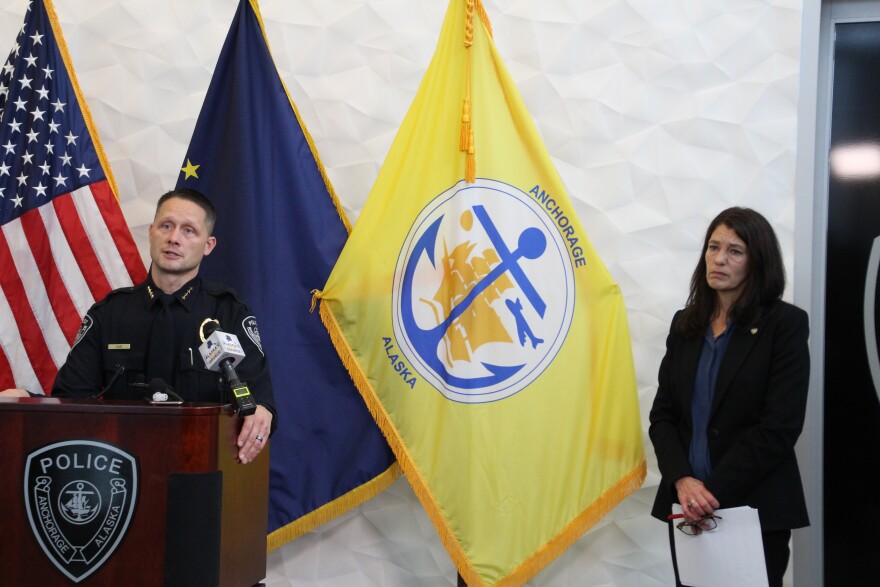Anchorage leaders are weighing how best to respond to the high number of police shootings in recent months, but not everyone is in agreement over what should be done, and how quickly to do it.
Anchorage Assembly members, Mayor Suzanne LaFrance and Police Chief Sean Case all gathered at a special public health and safety committee meeting Wednesday to discuss the string of six police shootings since mid-May. Four of those shootings were fatal.
The most recent happened on August 13, when officers shot and killed 16-year-old Easter Leafa after a family member called 911 and said Leafa was threatening others with a knife. LaFrance publicly apologized for the killing shortly after, and drew criticism from the head of the police officers’ union, who said he was “dismayed” at the implications of her comments.
LaFrance clarified her position during the meeting.
“Multiple things can be true at once,” LaFrance said. “Grief for Easter does not undermine support for sworn officers. Support for sworn officers does not undermine a commitment to change.”
In response to the shooting, LaFrance and Case announced a slate of reforms to the Anchorage Police Department, including third party reviews of Leafa’s shooting and of APD’s policies, plus the formation of a community advisory board for the police.
But some Assembly members want the city to do more.
Several Assembly members, like Felix Rivera, are pushing for a civilian oversight model. He says that model could operate in a number of ways, including reviewing police shootings after they’re investigated by APD, or having civilian investigators be a part of the process. He and others have asked that a model like that be set up ahead of April of next year.
“For folks who follow municipal government, that's like super fast for us,” Rivera said. “”But I do think that we are in a crisis and that we need to act like it.”
Assembly chair Chris Constant cautioned that members not rush to make proposals, and said the LaFrance administration should be given time to weigh a number of options.
“I've heard as a theme from most members for the last six weeks that we need to allow the administration time to develop their proposals for all of the various entities within the municipality,” Constant said. “And I am going to recommend that this body adopts that same approach to this question, because this is the most sensitive matter we are facing right now as a municipality.”
Assembly member Daniel Volland, who also supports Rivera’s civilian oversight proposal, pushed back on Constant’s remarks over rushing the process. He cited the more than two years it took for officers to implement body cameras after voters approved them.
“The community is not frustrated by rapid action,” Volland said. “They are frustrated by very slow action and inaction, and so we have limited opportunities as Assembly members to weigh in on these issues, and part of our job as elected officials is to be responsive to constituent concerns.”
Voland also expressed concern that many of the shootings involved people having a mental health crisis, and questioned whether APD was utilizing its mental health response units like the mobile intervention team.
“I don’t want to send the message to the community: Don’t call,” Volland said. “Don’t call the police because you might lose your loved one.”
Case responded by saying that the mobile intervention team is working to get trained in both dealing with police situations and negotiation tactics. He said APD policy is to not have mental health clinicians deal directly in situations where a weapon is present and also said his department is short staffed.
“We're just over a year into it, and I think we've expanded from what our original outlook was on the team, and we're going to continue adding more resources,” Case said. “If I had the staffing of officers to pair with them, I could tell you that I could triple the size of the team.”
As city leaders weigh how best to move forward to address police shootings, many community members continue to mourn Leafa’s death. During public comments in the meeting, Jefferson Uta with the Samoan Tribal Council of Alaska said Leafa’s family recently moved to the state, and expressed anguish for her mother.
“To our shame, she will forever remember her loss in a tragic manner,” Uta said. “But to also speak on behalf of our community, it was as if the officer came and shot a child of every Samoan family in Alaska.”
Uta said he’s requesting body camera footage of the shooting be made available, that Leafa’s mother be allowed to visit her daughter’s body and that a grand jury investigate the shooting.
Assembly members say they’re planning a community forum on Sept. 6 where members of the public can provide more feedback on the recent shootings.
Correction: This story previously incorrectly said the forthcoming public community forum will be hosted on Sep. 8. It is scheduled for Friday, Sep. 6.


